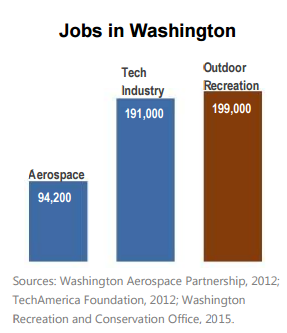WTA Testifies in D.C. to Champion Trail Funding
WTA's executive director gave testimony in D.C. on Tuesday to champion the need for increased investment in trails and recreation lands during a hearing hosted by the Senate Energy and Natural Resources Committee.

WTA Executive Director Jill Simmons with Senator Maria Cantwell.
"I believe that enhanced federal investment and creative partnerships are key to reducing the infrastructure backlog on federal lands. Washington Trails Association has been working for nearly 25 years to help maintain the trail infrastructure on public lands. We stretch tax dollars—donating more than $3 million in volunteer labor annually."
This was the cornerstone of the testimony that Jill Simmons, WTA's executive director, gave in Washington D.C., on Tuesday. Simmons discussed opportunities to improve and expand recreation infrastructure, such as trails, on the nation's federal lands. The hearing was hosted by the Senate Energy and Natural Resources Committee.
"The recreation economy is at risk because of the decades of chronic underfunding for infrastructure on public lands, which will be exacerbated by the current Administration’s proposed budget that includes deep cuts to the agencies that are needed to keep this economic engine humming," Simmons explained.
A video recording of the hearing can be viewed on the committee's webpage.
Supporting an under-recognized economic powerhouse
Simmons was invited by Sen. Maria Cantwell (D-WA) to testify, along with other experts, on federal lands infrastructure. Other experts spoke about the National Park Service, water, biomass and the ski industry. Simmons spoke about the outdoor recreation economy and the value of public lands. She cautioned that further cuts to already underfunded land management agencies would increase the multi-billion dollar maintenance backlog in our national parks and forests, in addition to stalling the $646 billion outdoor recreation economy.
Simmons highlighted that since 1977, the number of recreation visitor days on national forest trails has increased 376 percent. The Forest Service has reported that recreation is by far the single greatest use of the National Forest System. Yet, due to chronic underfunding, only 25 percent of national forest trails are maintained to the agency's standards.
 Towns that sit along the edge of national parks and forests would be particularly vulnerable under these cuts.
Towns that sit along the edge of national parks and forests would be particularly vulnerable under these cuts.
"Without trails to draw them in, people won’t have any reason to stop at local restaurants or gas stations that are scattered throughout gateway communities across the US," Simmons said.
Only 25 percent of Forest Service trails are maintained to standard, creating unsafe trails and loss of access to hikers and other trail users.
future investment in public lands with the help of volunteers
There was good news to share as well. Simmons explained that WTA's 4,700 volunteers donate more than $3 million in labor annually to Washington's public lands, evidence that hikers are ready to stretch the federal dollars invested in the places they love.
"Washington Trails Association, and the many partners we work with, stand ready to leverage increased federal investment with the hard work of volunteers. The people who use and love our nation’s trails want to partner with you to keep our public lands available for everyone to enjoy. "
How you can support federal funding for trails
WTA will continue working in D.C. to ensure Washington's thousands of miles of trails are cared for, but we can't do it without your help.
Your elected officials need to know voters in their district care about public lands. Use your voice for trails today. Sign our petition to show your support for trail funding.


Comments